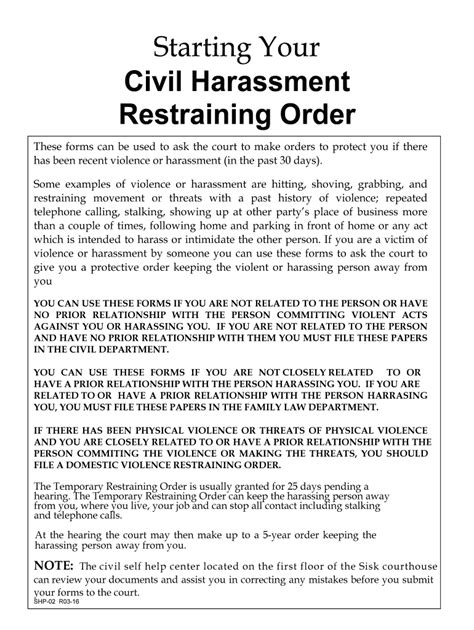Restraining Order: Seeking Help From a Professional
Navigating the complexities of a restraining order can be daunting and emotionally draining. Whether you're seeking one or are facing one, having professional guidance is invaluable. This article explores the crucial role professionals play in the restraining order process, answering common questions and offering insights into securing the best possible outcome.
What Types of Professionals Can Help with a Restraining Order?
Several professionals can provide crucial support throughout the restraining order process. These include:
-
Attorneys: This is arguably the most important professional to involve. A skilled attorney specializing in family law or civil litigation can guide you through the legal complexities, ensuring your rights are protected and your case is presented effectively. They can help you gather necessary evidence, draft legal documents, and represent you in court.
-
Therapists or Counselors: The emotional toll of domestic violence or harassment can be immense. A therapist can provide a safe space to process your feelings, develop coping mechanisms, and build resilience. Therapy can be particularly beneficial during the often stressful legal proceedings.
-
Advocates: Domestic violence advocates and victim advocates offer crucial support and resources, often providing assistance with navigating the legal system, accessing shelter, and connecting with other vital services. They can provide emotional support and practical assistance throughout the process.
-
Law Enforcement: While not strictly a “professional” in the same sense as the others, law enforcement plays a critical role in obtaining a restraining order. They often gather evidence and may be involved in enforcing the order once it's in place. It's important to report any violations promptly.
How Do I Find a Qualified Professional?
Finding the right professional is crucial. Here are some tips:
-
Ask for Referrals: Speak to friends, family, or support groups for recommendations. Your therapist, doctor, or even a social worker may be able to provide referrals.
-
Online Research: Use online directories and review websites to find attorneys, therapists, and advocates in your area. Pay attention to reviews and specialties.
-
Legal Aid Societies: If you have limited financial resources, legal aid societies can provide free or low-cost legal assistance.
-
Bar Associations: State bar associations often have referral services that can connect you with qualified attorneys.
What Happens During a Consultation with an Attorney?
Your initial consultation with an attorney will typically involve:
-
Reviewing Your Situation: The attorney will gather detailed information about the circumstances leading to the need for a restraining order, including dates, times, and specific incidents.
-
Discussing Legal Options: They will explain the legal process, the types of restraining orders available, and the potential outcomes.
-
Assessing the Evidence: The attorney will evaluate the evidence you have to support your claim. This may include photos, texts, emails, police reports, and witness statements.
-
Answering Your Questions: The attorney will address your concerns and clarify any uncertainties about the process.
What if I Can't Afford Legal Representation?
The cost of legal representation can be a significant barrier. However, several options exist:
-
Legal Aid Societies: As mentioned, legal aid societies offer free or low-cost legal assistance to those who qualify.
-
Pro Bono Services: Some attorneys offer pro bono services, providing free legal representation to individuals in need.
-
Payment Plans: Many attorneys are willing to work with clients to create payment plans to make legal services more accessible.
Can I Represent Myself in a Restraining Order Case?
While it's possible to represent yourself (pro se), it's generally not recommended. Restraining order cases can be complex, and a lack of legal knowledge can significantly hinder your chances of success. An attorney can ensure your rights are protected and your case is presented effectively.
What Evidence Do I Need to Obtain a Restraining Order?
The specific evidence required can vary by jurisdiction, but generally includes:
-
Documentation of Abuse: This might include police reports, medical records, photos of injuries, or witness statements.
-
Communication Records: Texts, emails, or social media messages that document harassment or threats.
-
Witness Testimony: Statements from individuals who have witnessed the abusive behavior.
This article provides general information only and should not be considered legal advice. Seeking professional help is crucial when dealing with restraining orders. Remember, your safety and well-being are paramount.

